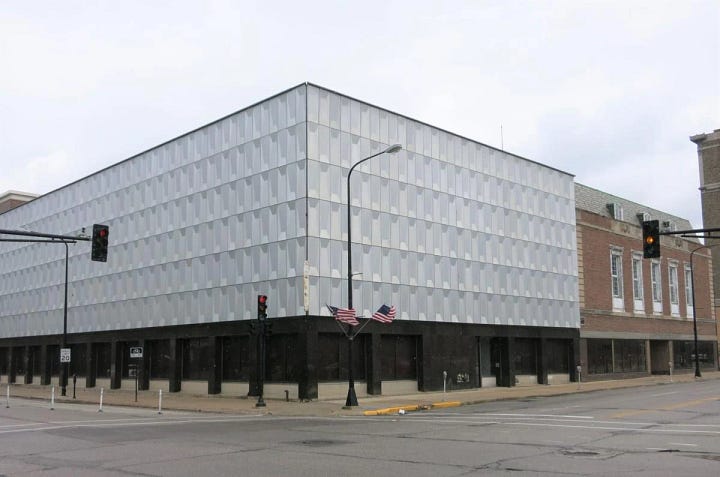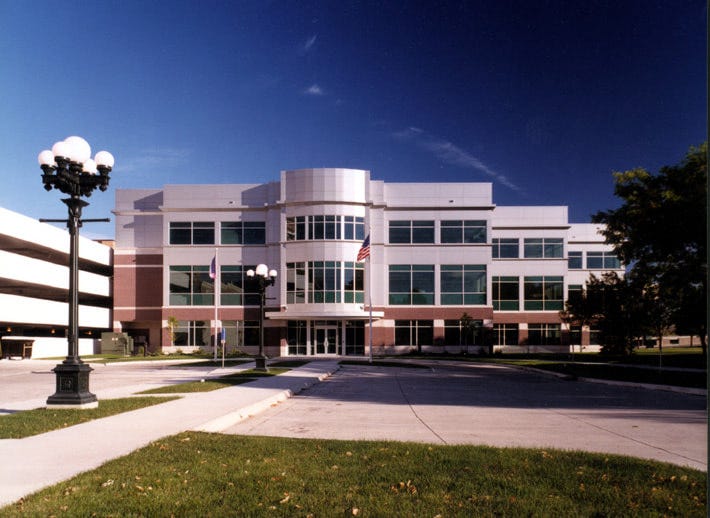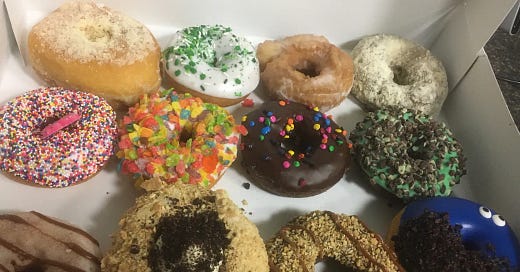Of donuts, dogged journalists and dear friends
Beleaguered newspaper journalists need support in their noble calling.
Earlier this year, I gave this talk to the Waterloo Study Group, a local discussion group in town exploring various contemporary issues. They invited me to talk about newspapers. I updated it a bit here to account for the passage of time.
WATERLOO — During the week before St. Patrick’s Day, I continued my tradition of buying donuts for friends and former colleagues at the Waterloo-Cedar Falls Courier.
There’s fewer donuts to buy these days. But I still buy them.
The Courier staff and the donuts are fewer in number. And that’s all the more reason to keep doing what I’m doing and give them a little encouragement.
I know what their challenges are. I know intimately. And that’s why I admire those who are still working there more than ever.
The Courier is no different than a lot of newspapers across the state and the country. News staffs have been cut 75 percent across the board for the papers that still exist, leaving fewer reporters to cover just as much news. That's after many circulation, mailroom and composing room staffs were completely let go because the paper is laid out and printed out of town.
Papers are thinner. And they’re published at greater distance and with less frequency.
Newspaper companies talk about “digital conversion,” switching from a print to an online product. Many folks subscribe to an e-edition, in which you can view paper just like the print version, but online.
While I bristle a bit at some of the conditions my friends are working under, I remain unwaveringly loyal to them.
Despite these conditions and others over the years, including the dissolution of pension funds, reduced 401k contributions, ever increasing health insurance costs, reductions of jobs by attrition and layoff and unpaid furloughs of employees, the Courier broke a major story in 2020 about the coronavirus outbreak at the Tyson Fresh Meats plant in Waterloo. It drew national attention to the plight of workers there. As it should have.
When employees and family members couldn't get any satisfaction out of their employer, their union, or people in positions of power in their community, they started calling the paper.
And that's part of the function of a responsible newspaper, or a free, vigorous and independent press in society, from Washington to Waterloo: to give a voice to the voiceless, the ignored, the pushed aside. Even if it ruffles some feathers.

I myself have invoked the displeasure of a few mayors, city managers, a few business movers and shakers, and even some clergy. And most people think I'm a nice guy. It goes with the trade sometimes.
But most journalists, at least not in the newsrooms I've worked in, don't go around spoiling for a fight. The just want to do their jobs and report what's going on with a clear eye and try to connect the dots and see the forest for the trees. They want to do a good job, finish their work on time == hopefully something less than 12 hour a day -- and get home and spend time with their families.
We live, work and play in our communities and feel the same way as a lot of people in town. We are no smarter than any of our friends and neighbors in our communities but we're the public's eyes and ears. We're supposed to ask the extra question, even if it challenges authority — because if it’s on our minds, there's a pretty good chance some of our friends and neighbors are thinking the same way.
I did have a very perceptive, conscientious incoming mayor tell me one time that we as a new staff should not go easy on him because it kept him on his toes, made him evaluate his own actions and kept him accountable to the public.
It's a lot easier to do that when you know your employer has your back. It's much harder when you see your resources dwindle little by little year to year and you look around and see empty desks where some of your comrades have been -- good people and good journalists caught in the corporate switches. And then take heat from some in the public for decisions beyond your control.
I will be the first to admit to a considerable amount of survivor's guilt. I left the Waterloo-Cedar Falls Courier full time six years ago. I could see what was coming and I had an opportunity to leave and took it. A year and a half before I left, a longtime colleague died of a heart attack at his desk after deadline in the middle of the night.
Three other people in the field I knew also passed away at about that same time, including Des Moines Register managing editor Randy Brubaker who was a childhood friend. We grew up a block apart in Waterloo and played pickup baseball games with the neighbor kids.
But by the same token , after a gunman shot up a newspaper office in Maryland in June 2018, and an all-staff meeting was called at the Courier, I came down and joined the meeting. I felt I needed to be with my journalism comrades.
I have continued to write for the Courier as a correspondent because I feel a sense of duty to my remaining former newsroom comrades - who are still my friends - and to the community. And I miss it a lot. I'd go nuts if I didn't have something to write about, though I'm happy not to be chasing firetrucks and police cars on weekends.


I've also found other outlets for my writing. In December 2022 I was invited to start writing a column called "View from the Cedar Valley" for Iowa Writers Collaborative. It's a group of current and former journalists from around the state that includes some former Register writers, published authors and poets and a Pulitzer Prize winner, Art Cullen of the Storm Lake Times. The columns appear online on Substack and it's a privilege to be part of the group.
I also have been able to do freelance work for nonprofit news organizations like IowaWatch, Investigate Midwest and Iowa Capital Dispatch. A lot of that work has appeared in the Courier and other publications, as have some of my View from the Cedar Valley columns. Whether nonprofit journalism is the wave of the future remains to be seen.
However, I do NOT believe correspondents or part-time help can take the place of a full-time talented, dedicated, adequately staffed AND compensated newsroom. That's true whether news is in conventional print or online.
And, from what I hear from my friends and neighbors there is STILL a want and need for a printed paper people can hold in their hands, take some time with and read without being distracted by meaningless online click bait and popup ads. Ads pay the bills and are valuable communication too but should not aggravate readers and distract from the news.
If that observation makes me an old geezer, so be it. But I do not think the demand for a printed paper is confined to the older generations.
Let me offer one anecdote: For a couple of years now I have volunteered at the Minnesota Newspaper Museum at the Minnesota State Fair in the Twin Cities. They put out a paper every day with linotype and hot metal from a small paper that sold that equipment years ago when they went to an offset press.
And yes, they still have skilled linotype and press operators. I take turns running the paper folder and answering questions and it's quite a lot of fun; I get to use my journalism and museum skills.
Folks young and old still marvel at the process. A couple of young college-age men were pretty awestruck at the whole operation, and one of them said, "I know one thing: If everything goes to hell, I'm comin' for this!"
There's some wisdom in that. You can't computer-hack or delete the only way we used to do it. Power of the press.

And as my esteemed Eastern Iowa journalism colleague, former Cedar Rapids Gazette editor and devoted Hawkeye fan Lyle Muller noted, the fans at Carver-Hawkeye Arena this spring were holding up NEWSPAPERS marking Caitin Clark's historic achievement when she set the NCAA women's scoring record. She is elevating all of women's athletics and it's an empowering moment for women in general.
Folks 50 years from now are NOT going to want to wade through a bunch of popups and click bait to read about Caitlin Clark. There's a historic, artful place for books and newspapers -- just like record album covers. A computer or hand-held device is not a keepsake. A book or a carefully preserved newspaper is. Newspapers and local companies could capitalize on that instead of leaving it to one-off fly-by-night book publishers.
We are as the saying goes, the first draft of history.
And as Jimmy Stewart said as attorney Ransom Stoddard in one of my favorite Westerns, "The Man Who Shot Liberty Valance," "Here's the world's best textbook -- an honest newspaper."
Also, as legendary sportswriter Red Smith once said, "Telling the truth, and writing it vividly and with clarity, that's what makes it exciting.
I plead guilty to having "ink in my blood," as the saying goes. That's why, even at my advanced stage of the game, I want and hope to keep doing what I'm doing -- observing, interviewing, reporting and writing.
And to be there for my comrades and bring the donuts.
Pat Kinney is a freelance writer and former longtime news staffer with the Waterloo-Cedar Falls Courier and, prior to that, several years at the Ames Tribune. He is currently an oral historian with the Grout Museum District in Waterloo. His “View from the Cedar Valley” column is part of “Iowa Writers Collaborative,” a collection of news and opinion writers from around the state who previously and currently work with a host of Iowa newspapers, news organizations and other publications. They are listed below. Clink on the links to check them out, subscribe for free - and, if you believe in the value of quality journalism, support this column and/or any of theirs with a paid subscription .
The Iowa Writers’ Collaborative





Yes to all you wrote.
Great post. Thank you.